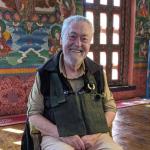Zen, God, and Doubt: Encountering the Mystery
There’s a lovely meme that floats around on social media. The words are by Rachel Held Evans. It goes:
“This is what God’s kingdom is like: a bunch of outcasts and oddballs gathered at a table, not because they are rich or worthy or good, but because they are hungry, because they said yes. And there’s always room for more.”
Evans was a very interesting person. A journalist, columnist, blogger, and author of several books. She was only 37 when she died unexpectedly in 2019 from an allergic reaction to treatment for an infection. She was a public Christian who, well, very publicly moved from Evangelicalism to the Episcopal Church.
A center of her spirituality was a profound commitment to uncertainty. Journalist Emma Green in her obituary of this remarkable woman, called her a “joyful troublemaker.” Methodist minister and academic Jim Burklo wrote how “she appealed so strongly to evangelicals, especially women, who grew frustrated with the misogyny, homophobia, and anti-intellectualism pervading that Christian subculture.” Reviewing a book posthumously compiled by her friend Jeff Chu, Burklo writes:
“I could not help wondering, as I read the book, how her theology would have evolved further had her life not been cut so short. She was well on her way to being a formidable intellectual. In the book, she admitted that as far as she’d gone in her embrace of progressive theology and practice, she was far from having all the answers to her still-burning questions about the faith. What to make of the creeds? Just who or what are we talking about when we talk about God? For someone who came so far so fast, it is alluring to consider just how much farther she could have gone – and we with her.”
“What if” is one of those delightful things we humans like to do. It’s also something of a red herring, allowing us to chase after ghosts of one sort or another. For me the important thing about her is how as a Christian she wholeheartedly embraced doubt as a spiritual discipline.
Searching around I found a couple of things she said about doubt. “Doubt is the mechanism by which faith evolves and matures. It’s the only way we can slough away false fundamentals that obscure (and sometimes poison) the gospel. If embracing that means I ‘celebrate doubt,’ then let me be the first to offer a toast.” Elsewhere I found a quote attributed to her first book, “Doubt is a difficult animal to master because it requires that we learn the difference between doubting God and doubting what we believe about God. The former has the potential to destroy faith; the latter has the power to enrich and refine it. The former is a vice; the latter a virtue.”
An interesting parsing.
And, me. I believe if we don’t doubt God, we cannot be faithful. It is not a vice. It speaks to the heart of the matter. But, also, it isn’t a complete question. Because, as she said, doubt’s a difficult animal. In my own life my first great existential question, birthed long before I knew the word existential was “Is God Real?” It took me on a path that was very painful, and very important. An honest read of the scriptures shows the God of the Hebrew texts evolved. It’s not a leap to say there are different Gods through the different strata of the scriptures.
So having integrity, engaging the world honestly, doubting God’s very existence feels to me to be critical. Faithfulness, as I find it, is to the truth. Truth, of course, is a slippery beast. It might be a face of the divine. But I’ve also seen that word stand in for some very unlikely things. I’ve also seen how the more unlikely someone’s “Truth,” the more inclined the holders of that truth are to violence in defense of it.
“Truth” often is more an icon for what one already believes rather than what’s left after assertions are put to various tests the rational mind can conjure. For me Truth seems to demand some connection to the world that has been revealed through that scientific method. Otherwise its just mind bubbles. And, as I noted, adherents to a simply asserted truth can be dangerous people. But people have been investigating the world and its truths for a while now. And. What is reveal as true if not Truth is weird, really weird. But it also shows patterns. And within those patterns things emerge.
Like us. And with that our minds.
It’s pretty obvious, again, as I see it, that all animals have minds. Animals problem solve, they also have opinions, at least they show likes and dislikes. But our particular human gift, such as it is, is that we know we’re alive, and we know we’re going to die. As an aside, what we know of Koko the signing gorilla has something of an eye of the beholder quality to it, but it does appear she understood she was alive and that she was going to die. So maybe even that twin knowing isn’t uniquely human. But we write books about it. We compose songs. And we tell ourselves stories. There’s where we find a certain human universality. Our mortality. And our attending to what it can mean. Tbere’s a truth. Not, perhaps, the Truth. But this cannot be ignored in the pursuit of that capital “T.”
Out of that what I find is that for humans along the way, the real question, that more universal question is one question, but it has two parts. Why am I alive? Why do I die? Or, what is this life and death thing?
And.
God becomes one of the possible answers to that question. God is an assertion about the why of things. And all of a sudden that God, the one which has evolved, and actually there’s a further step past “the only God,” to a God that is everything. An interesting assertion.
Now, for me, I actually found the question, the first question, my burning question was “Is there a God?” My vice. And a burning one. And. Can I say, of course. It was totally bound up with my question about life and death, and with that of meaning and meaninglessness. Good stuff for the adolescent heart. Not fun. Not nice. But good.
It drove me forward. It launched me on a quest.
And after I realized that I don’t believe in the God of contemporary Christianity (nor of Judaism in its most mundane form, nor of Islam), that didn’t mean I was done with God. It was just I was done with what I think of as the cheap God. The big human in the sky God. Many of my friends are content with that answer. There is no God. And move on to other things.
But there are other things that the word God points to. That in the west God evolved, suggests to me that we humans have used the word to capture not only our deepest hopes and fears, but also what we’ve found within our deepest explorations.
And I realized in rejecting the most unlikely use for the word God, that big human, only one facet of the question was resolved. For me. Without knowing it God became my koan. Koans are a spiritual discipline within the Zen tradition. From outside they can look like non sequitur. And the frame for that burning question of meaning, of life and of death, was “What is God?” A framing of Rachel Evan’s virtuous question, I believe.
If God is not a big human in the sky, what is God?
God and God’s kingdom, to use Jesus’ preferred term, seem to be the same thing to me. Or, if not one thing, not two either.
And that’s where Rachel Held Evans and I seem to find commonalities. Why that quote captured me. And so deeply.
“This is what God’s kingdom is like: a bunch of outcasts and oddballs gathered at a table, not because they are rich or worthy or good, but because they are hungry, because they said yes. And there’s always room for more.”
Something in there. Something in that.
What in Zen is called a full presentation. And. A pointer to the koan’s answer. Practice. Preparing. And Doing. And, if you will, finding.
What does it look like? Something very intimate and personal. While at the same time, wildly bound up with others.
Found in hunger.
Found in yes.














